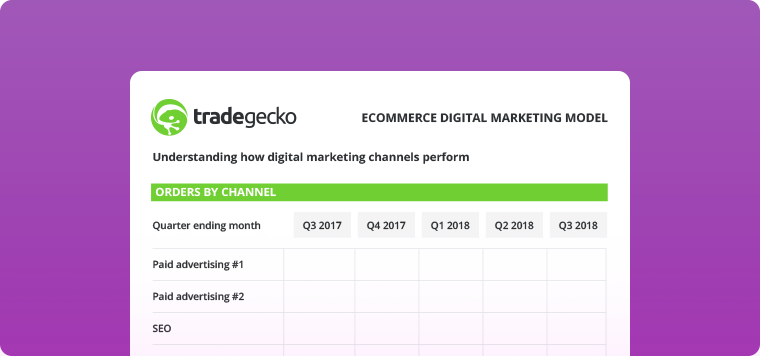To determine how you can best use your time and resources to invest in a digital marketing strategy, you should first understand what types of channels can be utilized and which are more appropriate for your business needs.

A guide to digital marketing channels for eCommerce
Download your FREE Digital Marketing Tool for eCommerce!
Record your key metrics, marketing channels and performance data in one place whilst pre-populating key reports so you can easily see how you’re tracking.
Most digital marketing falls into the following categories:
Paid marketing
Any form of online marketing where you pay for ads. It can be in the form of pay per click (PPC) advertising, where you pay every time a person clicks on your ad, or cost per thousand (CPM), where you pay per thousand impressions your ad receives. This type of marketing includes platforms such as Google AdWords, Google Display Network ads, and Facebook advertising.
What works: ads driving to optimized landing pages; paid ads combined with organic marketing efforts
What doesn’t work: bland/non-specific ad copy; campaigns with too broad an audience
Social media marketing
Covers any marketing activity you undertake on social media, such as Facebook, YouTube, Instagram, LinkedIn, Snapchat, and Twitter. Social media marketing is one of the best ways to gain exposure for your business and engage with your customer base.
What works: highly targeted ads, content that aligns with trends
What doesn’t work: over-advertising to loyal customers, irrelevant content
Content marketing
Creating sticky, engaging content online that your customers or potential customers are interested in. Content marketing is most often in the form of blogs on a website, but also includes everything from infographics to videos (64% of users are more likely to buy a product online after watching a video).
What works: content that solves a problem or answers a question, content that encourages feedback
What doesn’t work: poorly researched or misinformed content, forcing keywords where they don’t flow naturally
Search engine optimization (SEO)
Optimizing content and the structure of your website to improve your organic (non-paid) rankings in search engines. SEO goes hand in hand with any organic content marketing strategy, as it helps ensure your content is surfaced as much as possible.
What works: high-quality and useful content, well-structured and easily navigable website
What doesn’t work: keyword stuffing, plagiarized or copied content
Affiliate marketing
Performance-based digital marketing where you pay for conversions rather than clicks or impressions. Usually you pay a commission to an external website for any traffic or sales that have been referred by that website.
What works: targeting a niche audience, compelling content
What doesn’t work: spammy or overly sales-y content
Email marketing
Sending email updates, special offers etc. to a list of subscribers. This can be a great way to nurture and retain your existing customer base, or to incentivize potential customers to make a purchase.
What works: personalized, customer-centric emails
What doesn’t work: emailing too frequently, overly long or complicated emails
Viral marketing
Usually involves a combination of the above digital marketing strategies, which results in a fast and significant increase in interest in your business. It generally involves mass sharing of a marketing piece through any online channel, or online interest coming from other means such as TV or grassroots marketing.
What works: engaging and unique content, a solid digital marketing strategy combining a variety of channels
What doesn’t work: restricted access (content should be easy to share)

Which social media channels should you invest in?
Social media is an extremely popular form of digital marketing, and it’s easy to see why – it can be used to engage and nurture existing customers, and reach out to a huge network of potential customers all in the one place. Let’s take a look at some of the most common platforms and when they’re best used:
Facebook – considering the versatility of the platform, Facebook is a great starting point for most B2C eCommerce businesses, particularly those with a target market aged 25-34. The marketing options are vast, as is the audience base.
Instagram – worthwhile for eCommerce businesses with a visually appealing product or service, particularly in the food, fashion, travel, fitness or art industries. An average engagement rate of 4.21% makes Instagram one of strongest platforms for businesses.
Snapchat – skews younger than Facebook or Instagram, with 46.8% of its users between the ages of 18 and 24. It also tends to be a much more expensive advertising option, so should be considered carefully before investing in.
LinkedIn – best utilized by eCommerce businesses offering B2B products or services. Keep in mind that the cost per click tends to be higher than other social media advertising.
Pinterest – similar to Instagram, Pinterest marketing is most effective for businesses in sectors such as food, fashion, travel etc., where the product or service is visually appealing and the target market is highly engaged.
Social media best practices
While best practice on social media depends on the platform and your type of eCommerce business, there are some general rules you should follow:
- Respond and interact with followers – show that you are engaged and interested in your audience
- Keep it short and sweet – try to be as to-the-point and punchy as possible for most posts, unless it’s lengthier thought piece or emotionally driven story
- Use your brand voice – how does your audience speak or want to hear you speak? Stick to a defined tone
- Be transparent – consumers appreciate honesty and it will help build trust with your community
- Strategize – all your social media activity should tie into your overarching digital marketing strategy in some way
- Review and revise – don’t keep posting the same types of content if it isn’t working – measure your success and refine your approach continually
Examples of great digital marketing initiatives
Looking at the success of other businesses’ digital marketing campaigns can give you a valuable insight into ways you can leverage your own content online. Here are some examples of marketing pieces done well:
Paid marketing: Thr1ve

Why this works: it’s visual, informative, and has a unique value proposition ($25 off your first order)
Social media marketing: Buzzfeed Tasty

Why this works: the videos are visually appealing, short (wasting no time), and informative
Great viral marketing example: Always #LikeAGirl video
Why it works: it’s emotionally engaging and succeeds in tying a brand to a social cause/movement
Ready to get strategic about your online marketing? Our free digital marketing for eCommerce tool helps you define, measure and analyze your marketing efforts in one place.
Download your free eCommerce Digital Marketing Model today.
About the eCommerce Digital Marketing Model creator:
Taylor Davidson is the founder of Foresight, which helps entrepreneurs use financial models for business decisions.
Through his template financial models and strategic advisory services, he has helped over 18,200 entrepreneurs on financial planning, projections, fundraising, and business strategy.









